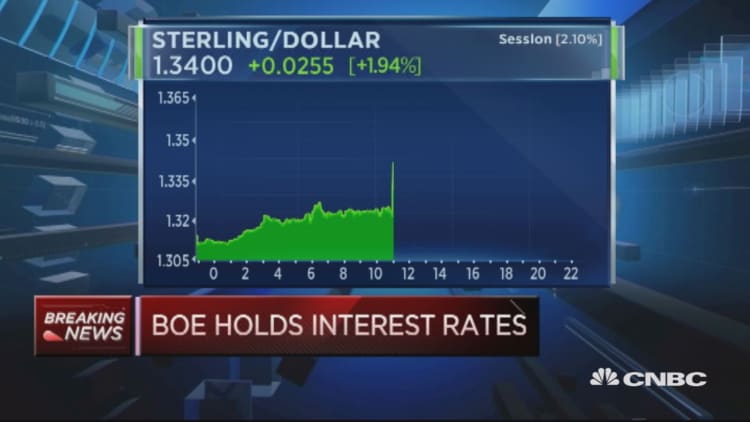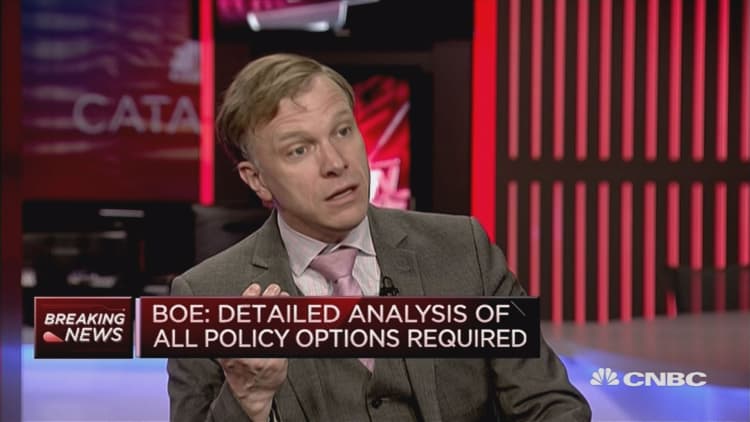


The Bank of England surprised markets by holding interest rates on Thursday, despite prior guidance from Governor Mark Carney that policy easing could be forthcoming.
Markets had priced in a rate cut of 25 basis points to 0.25 percent, which would have been the first change to the key rate since 2009. This followed financial market turmoil and economic and political uncertainty following to the U.K. public's vote to leave the European Union on June 23.
Instead, the bank's Monetary Policy Committee (MPC) voted by a majority of eight-to-one to hold the rate at 0.5 percent and unanimously to make no further additions to its £375 billion ($501.2 billion) quantitative-easing program. The one dissenting member, Gertjan Vlieghe, voted for a 25-basis point cut.
Sterling rose to a two-week high of $1.3480 on the news, while the international focused benchmark FTSE 100 trimmed some of its gains. The domestically focused FTSE 250, which tracks mid-cap companies, gained to trade up 0.4 percent.
Markets were surprised by the decision because two weeks ago, Carney publicly said "some monetary policy easing would likely be required over the summer," following the referendum. He did not specify what form easing might take or when exactly it might occur though.
There were strong hints of easing next month, however.
"In the absence of a further worsening in the trade-off between supporting growth and returning inflation to target on a sustainable basis, most members of the committee expect monetary policy to be loosened in August," the minutes said.
The minutes from the bank's policy-setting meeting on Wednesday provided two possible explanations for the committee's decision to hold rates in July.
Firstly, that financial markets had functioned well in the wake of the Brexit vote, despite the immediate tumult in equities, sterling and euro trade.
"The Committee had taken some reassurance from the evidence that markets had continued to function effectively throughout the period. The overall resilience of the U.K. financial system, and the flexibility of the regulatory framework, had allowed the impact of the referendum results to be dampened rather than amplified," the minutes said.
Secondly, policymakers felt it was too early to make a judgment on the medium-term impact from the vote.
"Few hard data covering the post-referendum period has yet been released and very little survey evidence was available so far … As yet, there has been no survey data released on how, if at all, households and businesses had adjusted their expectations following the result," the minutes said.
In June, Carney said the MPC would make an initial assessment of the situation at its July meeting, before discussing in more detail "the range of instruments at our disposal" in August.
The bank is set to publish its first inflation and growth forecasts since the referendum in August and Carney and the MPC may feel those estimates are crucial before making any major policy changes.

After the announcement on Thursday, ex-MPC Member Andrew Sentance said the bank should wait beyond summer to take any action.
"Though political events have been fast-moving, there is a need for stable economic policy until we are clearer how the economy is performing in the wake of the EU referendum result. That will not be clear until the autumn and the MPC should hold fire until then," Sentance, who is now senior economic adviser at PwC, said in a note.
The central bank did however make minor policy alterations immediately after the vote. It extended its indexed long-term repo operations on a weekly basis until the end of September and said it would provide more than £250 billion of additional funds to support financial markets if necessary. Plus, it has cut the counter-cyclical capital buffer rate for U.K. banks to 0 percent from 0.5 percent of financials' U.K. exposure with immediate effect. This latter measure is aimed at ensuring banks continue to lend to creditworthy businesses and households.
The rapid change of political leadership in the U.K. has provided some reassurance to markets, assuaging fears of political vacuum after David Cameron announced his upcoming resignation as prime minister.
Prime Minister Theresa May was formally appointed on Wednesday evening and has announced sweeping changes to ministerial positions, with Philip Hammond replacing George Osborne as finance minister.

